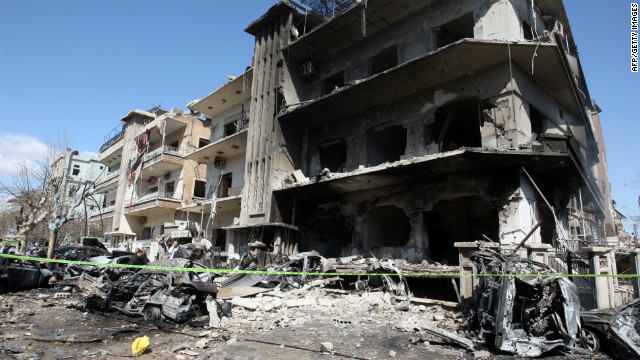Traders work on the floor of the New York Stock Exchange (NYSE) in New York. Photographer: Scott Eells/Bloomberg

March 22 (Bloomberg) -- Jill Cuniff, president of Edge Asset Management, discusses investment strategy and the outlook for the stock market. She speaks with Betty Liu and Dominic Chu on Bloomberg Television's "In the Loop." (Source: Bloomberg)
U.S. stocks retreated, trimming the longest monthly rally since September 2009 for the Standard & Poor’s 500 Index, as manufacturing contracted in China and Europe and FedEx Corp. (FDX) tumbled amid a disappointing forecast.
FedEx sank 4.5 percent after the world’s largest cargo airline predicted slower growth in coming quarters. The Dow Jones Transportation Average, which is considered a proxy for economic growth, slumped 1.9 percent. Commodity shares had the biggest losses in the S&P 500 among 10 groups as Alcoa Inc. (AA) and Chevron Corp. (CVX) dropped at least 2.3 percent. Bank of America Corp. (BAC) fell 1.8 percent to pace declines in financial shares.
The S&P 500 lost 0.6 percent to 1,393.99 at 1:23 p.m. New York time, slumping 1.1 percent in three days. It’s risen 2.1 percent in March, on pace for a fourth monthly rally. The Dow Jones Industrial Average fell 67.47 points, or 0.5 percent, to 13,057.15. The Russell 2000 Index slid 1.2 percent to 820.39. About 3.6 billion shares changed hands on U.S. exchanges.
“We are watching China closely,” said Scott Armiger, a portfolio manager at Christiana Trust in Greenville, Delaware, which has $11 billion in client assets. “There are still a lot of questions about the pace of economic growth,” he said. “It’s not unusual to have a pullback in the market after a strong run. We’ve made a lot of money in less than six months. We’ve been questioning: are investors being too greedy?”
Equities joined a global slump today as a Chinese manufacturing index indicated a worse contraction this month. Euro-area services and manufacturing output contracted more than economists forecast. Stocks fell even after data showed that jobless claims dropped to the lowest level in four years, reinforcing signs the U.S. labor market is picking up.
2012 Rally
Today’s slump trimmed this year’s gain in the S&P 500 to 11 percent. The benchmark gauge is up 27 percent from its October 2011 low amid economic and corporate data that exceeded projections. Financial and technology shares have soared at least 33 percent during that period.
“There’s enough of a reason there after the sharp run-up in stocks for the market to pull back or go sideways in the short term,” said Mark Bronzo, who helps manage about $125 billion at Guggenheim Investments, in Irvington, New York. “Most people recognize that China growth has slowed. It’s a question of: is it going to be a sharp or a mild slowdown?”
Companies most dependent on economic growth had the biggest declines among 10 groups in the S&P 500 today, as commodity, financial and industrial shares retreated at least 1 percent. The Morgan Stanley (MS) Cyclical Index dropped 2 percent. A measure of 11 homebuilders in S&P indexes slumped 2 percent.
FedEx Forecast
FedEx slumped 4.5 percent to $91.56. It forecast a profit range for its current fiscal quarter whose low end trailed analysts’ estimates amid slowing express-shipment demand.
The company is responding to a drop in express shipments and “below-trend” growth by parking an unspecified number of planes in the desert, reducing flight hours and reviewing domestic capacity. The range of goods delivered by FedEx and United Parcel Service Inc. (UPS) makes them economic barometers.
Energy and raw material shares retreated as the S&P GSCI gauge of commodities declined amid concern about slower demand. Alcoa retreated 2.5 percent to $10.01. Chevron slumped 2.3 percent to $105.48. Consol Energy Inc. (CNX) tumbled 5.7 percent to $32.50 for the biggest drop in the S&P 500. Industrial companies also declined as Caterpillar Inc. (CAT) dropped 2.7 percent, the most in the Dow, to $106.06.
The KBW Bank Index lost 1.2 percent as all of its 24 companies declined. Bank of America slipped 1.8 percent to $9.65. Citigroup Inc. (C) slipped 1.9 percent to $37.07.
Discover, Dish
Discover Financial Services (DFS) added 4.2 percent to $32.97. The payments network company said fiscal first-quarter profit rose 36 percent to a record as consumers spent more on credit cards.
Dish Network Corp. (DISH) rose 3.2 percent to $33.37. The second- largest U.S. satellite-TV provider has its share-price estimate increased to $41 from $35 at Deutsche Bank AG. U.S. regulators began removing barriers to the company’s proposed mobile high- speed data network, voting 3-0 yesterday to begin recasting rules that reserve the company’s recently acquired airwaves for satellite use.
Bats Global Markets Inc. (BATS), founded by a high-frequency trader and nurtured by the world’s top securities firms into the third-largest U.S. stock exchange operator, will seek more than $100 million for its owners today. It plans to sell 6.3 million shares between $16 and $18 apiece after the close of trading.
Underwriters led by Morgan Stanley, Credit Suisse Group AG and Citigroup are pricing the shares at about 16.9 times estimated 2013 earnings, according to Diego Perfumo, an analyst at hedge fund adviser Equity Research Desk.
13 Employees
Started in 2005 with 13 employees, Bats was steered to prominence by brokers and traders trying to hold down fees as the New York Stock Exchange and Nasdaq Stock Market bought their biggest electronic rivals. Now, with its venues accounting for 11 percent of U.S. share volume, the Lenexa, Kansas-based company is seeking a valuation that is higher than its biggest competitors, data compiled by Bloomberg show.
“Naysayers would have said these guys were just a disruptive influence and Bats was created to beat up on the traditional exchanges,” Larry Tabb, chief executive officer of research firm Tabb Group LLC in New York, said in a phone interview yesterday. “The IPO makes the case that Bats is a legitimate exchange just like NYSE and Nasdaq.”


